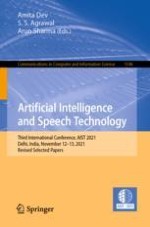2022 | OriginalPaper | Buchkapitel
Sarcasm Detection in Social Media Using Hybrid Deep Learning and Machine Learning Approaches
verfasst von : Tanya Sharma, Neeraj Rani, Aakriti Mittal, Nisha Rathee
Erschienen in: Artificial Intelligence and Speech Technology
Aktivieren Sie unsere intelligente Suche, um passende Fachinhalte oder Patente zu finden.
Wählen Sie Textabschnitte aus um mit Künstlicher Intelligenz passenden Patente zu finden. powered by
Markieren Sie Textabschnitte, um KI-gestützt weitere passende Inhalte zu finden. powered by
